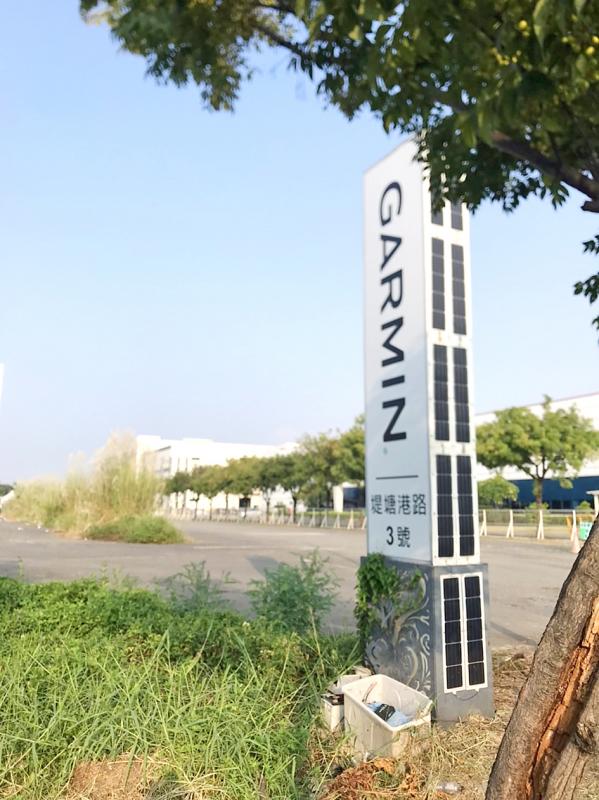Primax Electronics Ltd (致伸科技) is planning to build new manufacturing facilities and advanced laboratories in Hsinchu County’s Jhubei City (竹北) as it continues to develop audio, visual and interface solutions to maintain market leadership, the Ministry of Economic Affairs said on Friday as it approved a NT$2.5 billion (US$89.7 million) investment application by the audio and PC peripherals maker.
The company would launch intelligent production lines in the new plants to produce diversified products at smaller volumes, including advanced driver assistance system (ADAS) camera modules for electric vehicles, and Internet of Things solutions and application modules, the ministry said in a statement.
The company’s planned investment also includes new industry incubators and product development centers, the ministry said.

Screengrab from Primax Electronics Ltd’s Web site
Primax, which has production bases in Taiwan, Thailand and China, mainly manufactures audio, visual and interface products for consumer electronics, and office automation tools, with interface business serving as a sales driver.
The company has reported increasing orders of ADAS camera modules from Tesla Inc after the US automaker expanded capacity.
Despite ongoing component shortages, the company reported cumulative revenue of NT$44.96 billion in the first eight months of this year, up 8.47 percent from the same period last year, company data showed.

Photo courtesy of the Tainan City Government via CNA
Primax’s investment plan comes in response to customer needs and production risks amid the COVID-19 pandemic, it said.
Primax was one of seven local companies that the ministry last week approved to join the government’s three major investment incentive programs.
The others were Ding-Shen Mechanical Co (鼎聖機械), Phoenix Silicon International Corp (昇陽國際半導體), Jin Zhi Plastic Co (金智塑膠), auto parts maker Yii Ming Enterprise Co (翌銘實業), Tsin Ying Metal Industry Co (晉英金屬工業) and conveyor equipment supplier Chiao Fong Hang Co (喬豐行).
As of Friday, the ministry had approved applications from 1,009 companies, with investments totaling NT$1.35 trillion, since it launched the incentive programs in early 2019.
The firms are expected to create 114,200 jobs, the ministry said, adding that another 50 firms are awaiting approval.
Separately, GPS and wearable device manufacturer Garmin Ltd (台灣國際航電) on Friday received regulatory approval for the registration of its new plant at Tree Valley Park (樹谷園區) in Tainan’s Sinshih District (新市), the Tainan City Economic Development Bureau said in a statement yesterday.
Bureau Director-General Chen Kai-ling (陳凱凌) said that Garmin has been manufacturing in Taiwan for 32 years, producing 95 percent of its products locally.
The company’s NT$9 billion investment in the new plant is expected to generate annual production value of more than NT$50 billion and create more job opportunities in Tainan, the bureau said.
The plant is expected to offer about 1,000 jobs at its initial stage, with more than 7,500 jobs to be created in the long term, the bureau added.
Welcoming Garmin’s investment, Tainan Mayor Huang Wei-che (黃偉哲) said that the city looks forward to seeing more investment in a wide range of sectors, from traditional industries to smart and green energy technology.

Taiwanese suppliers to Taiwan Semiconductor Manufacturing Co. (TSMC, 台積電) are expected to follow the contract chipmaker’s step to invest in the US, but their relocation may be seven to eight years away, Minister of Economic Affairs J.W. Kuo (郭智輝) said yesterday. When asked by opposition Chinese Nationalist Party (KMT) Legislator Niu Hsu-ting (牛煦庭) in the legislature about growing concerns that TSMC’s huge investments in the US will prompt its suppliers to follow suit, Kuo said based on the chipmaker’s current limited production volume, it is unlikely to lead its supply chain to go there for now. “Unless TSMC completes its planned six

Intel Corp has named Tasha Chuang (莊蓓瑜) to lead Intel Taiwan in a bid to reinforce relations between the company and its Taiwanese partners. The appointment of Chuang as general manager for Intel Taiwan takes effect on Thursday, the firm said in a statement yesterday. Chuang is to lead her team in Taiwan to pursue product development and sales growth in an effort to reinforce the company’s ties with its partners and clients, Intel said. Chuang was previously in charge of managing Intel’s ties with leading Taiwanese PC brand Asustek Computer Inc (華碩), which included helping Asustek strengthen its global businesses, the company

Power supply and electronic components maker Delta Electronics Inc (台達電) yesterday said second-quarter revenue is expected to surpass the first quarter, which rose 30 percent year-on-year to NT$118.92 billion (US$3.71 billion). Revenue this quarter is likely to grow, as US clients have front-loaded orders ahead of US President Donald Trump’s planned tariffs on Taiwanese goods, Delta chairman Ping Cheng (鄭平) said at an earnings conference in Taipei, referring to the 90-day pause in tariff implementation Trump announced on April 9. While situations in the third and fourth quarters remain unclear, “We will not halt our long-term deployments and do not plan to

The New Taiwan dollar and Taiwanese stocks surged on signs that trade tensions between the world’s top two economies might start easing and as US tech earnings boosted the outlook of the nation’s semiconductor exports. The NT dollar strengthened as much as 3.8 percent versus the US dollar to 30.815, the biggest intraday gain since January 2011, closing at NT$31.064. The benchmark TAIEX jumped 2.73 percent to outperform the region’s equity gauges. Outlook for global trade improved after China said it is assessing possible trade talks with the US, providing a boost for the nation’s currency and shares. As the NT dollar